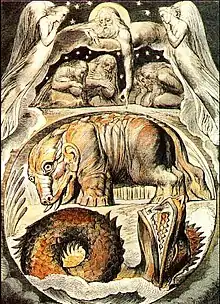behemoth
English
WOTD – 3 July 2006

Behemoth and Leviathan, by William Blake
Etymology
From Middle English behemoth, bemoth, from Late Latin behemoth, from Hebrew בהמות (bəhēmōt). The Hebrew word is either:
- an intensive plural of בהמה (bəhēmāh, “beast”), from Proto-Semitic (compare Ethiopic ብህመ (bəhmä, “to be dumb, to be speechless”), Arabic ب ه م (b-h-m)), or
- a borrowing of Egyptian
(*pꜣ-jḥ-mw, “hippopotamus”, literally “the ox of the water”), from pꜣ (“definite article”) + jḥ (“ox, cattle”) + mw (“water”) in a direct genitive construction; for the pronunciation, cf. the later Coptic descendants ⲡ- (p-) + ⲉϩⲉ (ehe) + ⲙⲟⲟⲩ (moou).![G40 [pA]](../I/hiero_G40.png.webp)
![M17 [i]](../I/hiero_M17.png.webp)
![V28 [H]](../I/hiero_V28.png.webp)

![N35A [mw]](../I/hiero_N35A.png.webp)
Pronunciation
- IPA(key): /bəˈhi(ː)məθ/
Audio (US) (file)
Noun
behemoth (plural behemoths)
- (biblical) A great and mighty beast God shows Job in Job 40:15-24.
- A great and mighty monster.
- (by extension) Something which has the qualities of great power and might, and monstrous proportions.
- 2012, James S. A. Corey, Gods of Risk, →ISBN:
- The wide access corridors passed slowly, the conduits and pipes like the circulatory system of some vast planetary behemoth.
Quotations
- 1611, The Holy Bible, […] (King James Version), imprinted at London: By Robert Barker, […], OCLC 964384981, Job 40:15–18:
- Behold now behemoth, which I made with thee; he eateth grass as an ox.
Lo now, his strength is in his loins, and his force is in the navel of his belly.
He moveth his tail like a cedar: the sinews of his stones are wrapped together.
His bones are as strong pieces of brass; his bones are like bars of iron.
- Behold now behemoth, which I made with thee; he eateth grass as an ox.
- 2001, Eoin Colfer, Artemis Fowl, page 58:
- Next she doused the smouldering troll with the contents of the restaurant's fire extinguisher, hoping the icy powder wouldn't revive the sleeping behemoth.
Derived terms
Translations
mighty beast in the Book of Job
mighty monster
See also
This article is issued from Wiktionary. The text is licensed under Creative Commons - Attribution - Sharealike. Additional terms may apply for the media files.